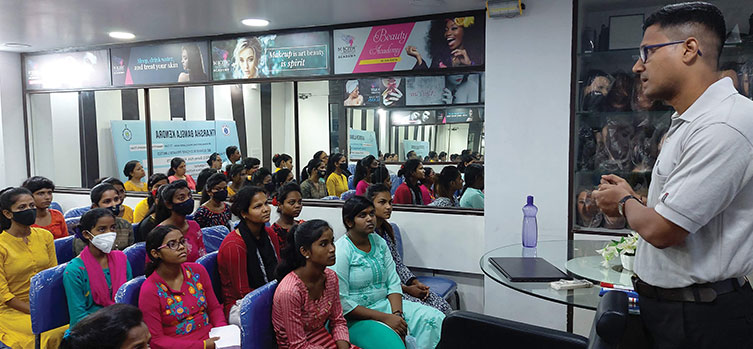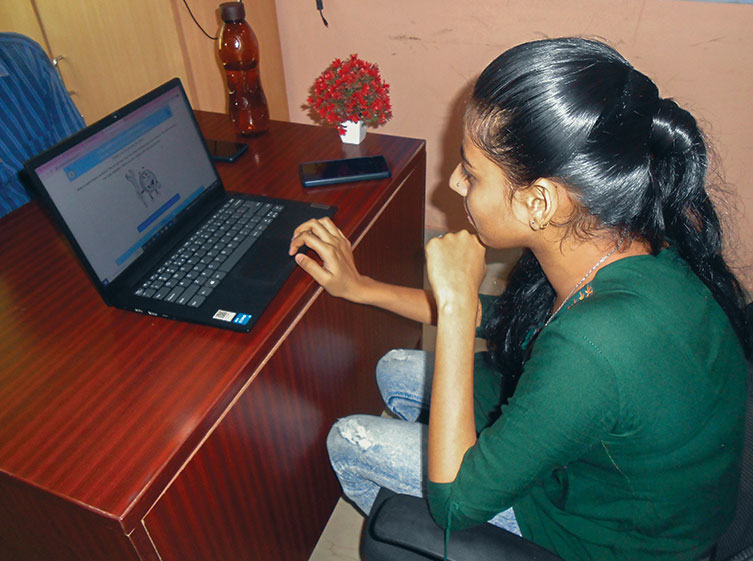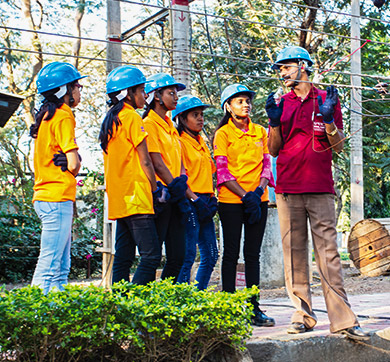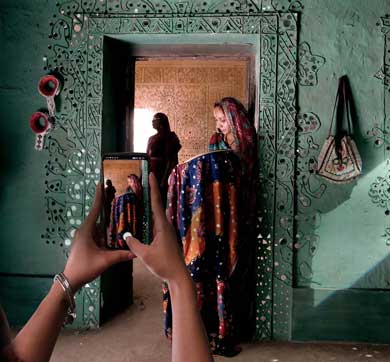June 2023 | 1179 words | 4-minute read
In December 2022, the unemployment rate in India rose to 8.3%, the highest recorded since August 2021, according to the Centre for Monitoring Indian Economy. This is at a time when the number of working age Indians has begun to maximise, with over 900 million people (67% of the total population) in the age group of 15-64.
The challenge to provide employment to this burgeoning workforce is an ongoing battle and one that Tata STRIVE, a skill-development initiative of the Tata Community Initiatives Trust (TCIT), is hoping to help address through its Karmadisha app.
The app uses gamification to help jobseekers identify the profession that matches their interests and that they are best suited for. It was developed in August 2021 for the West Bengal government’s nodal skilling agency, the Paschim Banga Society for Skill Development (PBSSD). The app aims to combat the lack of awareness of career options and career counselling, and challenges like low placements and high drop-out rates from PBSSD’s Utkarsh Bangla short-term skill training courses. “India has a supply-demand mismatch; there are jobs but not enough takers. Hence, matchmaking between people and jobs is an important solution to offer,” says Anita Rajan, CEO, Tata STRIVE and VP, TCIT.
Nantu Sheikh, 28, from Murshidabad says the Karmadisha app is like “someone who listens to your wishes and helps you follow your dreams”. Thanks to direction from the app, which tapped into his interest in machines and tools, and vocational training from PBSSD, the former daily wage labourer is now working as a mason with a multinational conglomerate.

Gamified assessment
Conceived in the form of a game so as to reduce inhibitions, Karmadisha is simple to navigate. After registering on the app, jobseekers are presented with visuals representing different professions. The photographs range from people engaged in carpentry and construction to those working in offices, hotels, and salons. Jobseekers indicate their interest by clicking on ‘like’, ‘dislike’ or ‘maybe’. The use of visuals rather than a written interaction increases inclusivity, making the app accessible to the unlettered as well.
“Through its visual triggers the app provokes the user to become aware of a variety of professions that may ignite their curiosity to seek more knowledge about these new sectors and perhaps also serve as a call to action to take up a suitable course,” says Ms Rajan.
"India has a supply-demand mismatch; there are jobs but not enough takers. Hence, matchmaking between people and jobs is an important solution to offer.”—Anita Rajan, CEO, Tata STRIVE and VP, TCIT.
The next step is a short Q&A with a chatbot — a need felt acutely during the pandemic, as an alternative to in-person sessions. This acts as added assessment, gauging how the jobseeker would react in various social scenarios — evaluating affinities, inclinations, and soft skills. Based on their responses a three-letter code is generated. It indicates their job aptitude and the kind of professions they would be best suited for. The PBSSD team then counsels them further and facilitates appropriate classroom and on-the-job training programmes in collaboration with partner agencies. Once the jobseekers are ready, the PBSSD team helps them find suitable jobs and career paths.
The app is modelled on the Holland Code Career Test, which is based on the vocational choice theory developed by American psychologist John L Holland, which states that ‘a person’s professional success and satisfaction depends on their personality and their interest in a certain work environment’. The test segregates jobseekers into six vocational personality types—realistic (doers), investigative (thinkers), artistic (creators), social (helpers), enterprising (persuaders), and conventional (organisers).
Tata STRIVE has been using the Holland Code and Interest Inventory, a picture-based career assessment tool, with students since 2016. The Karmadisha app has been built based on the learnings they’ve gained over the years. “Personality job fit is an important element of employee productivity, contributing to the joy of working and continuity in the profession and Karmadisha is an enabler in that direction,” says Ms Rajan.

Making an impact
Despite being a graduate, 22-year-old Sushmita Ray, from Alipurdwar in north Bengal, felt directionless when it came to choosing a career. She knew that she enjoyed interacting with people but didn’t know of a career that matched her interest. Ms Ray was introduced to Karmadisha at her local Block Development Office’s mobilisation camp and based on her three-letter code, the PBSSD team recommended a career in retail. They advised her a course in the field and on completion she was successfully placed in a popular fashion retail outlet.
For jobseekers like Ms Ray and others from disadvantaged backgrounds, Karmadisha provides informed choices and functions as a career counsellor that cuts across denominators like gender, literacy, educational qualification, and family background. Knowledge is truly power, but a majority of India’s youth are deprived of this very power as they do not have access to career counselling facilities and are unaware of the options available to them. This could lead to them blindly following friends or family, pursuing professions they are not interested in or do not have the aptitude for. “Lack of awareness of career options leads to limited thinking and a sense of hopelessness amongst the youth,” says Ms Rajan.
Potential for growth
The app is currently active across West Bengal, where it was first introduced under the Utkarsh Bangla scheme. The government has proactively reached out to jobseekers in large numbers and promoted the app in Industrial Training Institutes, at local skill development centres, through job fairs and via local and district-level officers. Dedicated official involvement and government outreach to the remotest regions is key to the success of such initiatives.
As of February 2023, 1,24,059 jobseekers have used Karmadisha and 30,000+ have been placed in jobs. The app is used almost equally by men and women, with more women opting for career counselling with Utkarsh Bangla. Of the aspirants who have used the app, 37% are undergraduates, 17.6% are graduates, and 17% are those who have cleared Class 10 and are looking for guidance. Analysis also reveals that graduates and undergraduates are more open to relocation or migration, but only outside their districts, not outside the state.
“Personality job fit is an important element of employee productivity, contributing to the joy of working and continuity in the profession and Karmadisha is an enabler in that direction.”—Anita Rajan
Referring to Karmadisha as a “solution of scale that allows thousands to engage at a time”, Ms Rajan says that analysing the data gathered via the app can be crucial in gleaning discernible patterns — choices of professions across genders, sectors, geographies and more. Governments with access to this information can use it to design critical interventions to enable skilling for high impact, retention, and consistent growth in employment rates.
Currently customised for the West Bengal government, communication on the app is in three languages — Bengali, Hindi, and English. But the platform architecture, software elements and design, created by Tata STRIVE, can be implemented in any state, complete with language translations and customisations as per the state’s requirements. The Tata STRIVE team has already presented Karmadisha to the Ladakh, Bihar and Maharashtra governments as well as other partners in the skilling ecosystem in a bid to take the idea national in the near future.
—Tejal Pandey
































